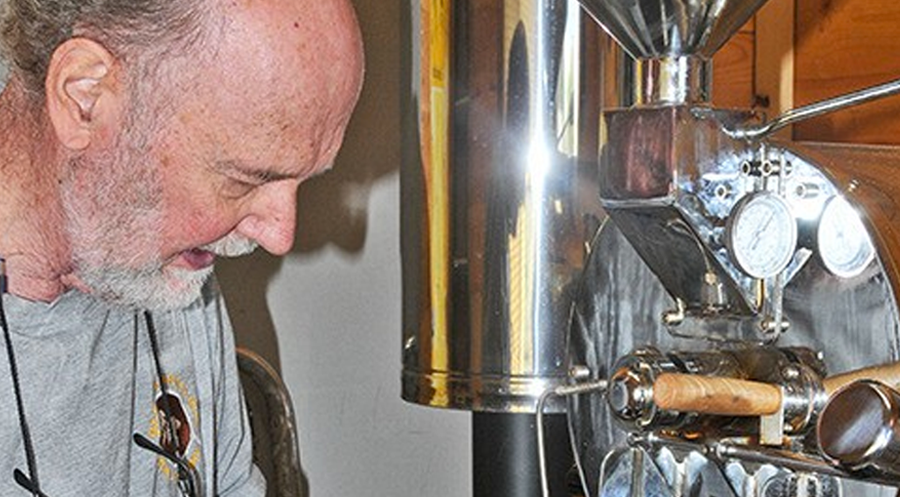
“My wife always loved good coffee… I eventually bought the business and became an artisan roaster in addition to supporting our Mayor in attempting to preserve our local health care system.”
David is a healthcare activist and is strongly rooted in his local community. Alongside his unwavering effort to support others, his relationship with food and nutrition began at a young age.
“My grandparents and parents (as children) were able to leave a Russian ‘re-education’ camp in Siberia with help from my great aunt in Argentina and a group of British activists. Before the revolution, they had lived and prospered in the Pale of Settlement and lost everything with their interment. I was born in southern Alberta at a time when “displaced persons” were still struggling to find acceptance in Canadian society.
Both my parents had heart issues – high blood pressure, type two diabetes, and weight concerns. My father loved rich foods, but when attempts were made to take control of his health, he often claimed that mother was trying to kill him with his own knife and fork. My mom rarely ate at the table but was almost always eating.
Being from an immigrant family, I rarely felt I fit in growing up. I tried very hard and had the added pressure of being told that nothing I do will ever be enough to fit in. As a child, I did my best to keep my weight close to what was ideal for me, but always a bit above.”
When David grew up, he married a woman who trained as a home economist – a person who advises on everyday lifestyle choices, teaches independent living skills, and develops food products or tests recipes. Now his meals are always fresh, balanced, and of mindful proportions.
“My wife always loved good coffee. After we moved to Ashcroft – a village in the interior of British Columbia with a population of about 1500 – a local roaster was going through some personal health issues and was having some trouble keeping his coffee business functioning. I agreed to assist him for a short time, but unfortunately, he never fully recovered. I eventually bought the business and became an artisan roaster in addition to supporting our Mayor in attempting to preserve our local health care system. I assisted local school teams and the travel club with my coffee business by providing coffee (at cost) for resale in their fundraising programs. This allowed them to direct the bulk of their purchase to support their children and educational programing further.
Around this time, I began to experience brief bouts of atrial fibrillation (AFib). I didn’t know what they were at the time, and they rarely happened in relation to coffee roasting. The journey of discovering what was really happening took several years. I was in at the Specialist’s office one day – he sent me down the hall to the lab and asked I bring back the report.”
David’s report showed that his heart was stopping and restarting more than it should, and his Specialist recommended he receive a pacemaker, a little device implanted into the chest to regulate the heart’s rhythm. The device was implanted shortly after. However, David’s AFib sessions continued.
“I had a venal ablation, followed by an atrioventricular (AV) node ablation which regrew or re-attached and then a second venal ablation. The second one seems to be holding. Through my cardiac journey, I’ve discovered that, for me, there appears to be a correlation between solar storms and my AFib sessions. I did some research on this but have since been distracted by other issues such as the sustainability of our rural health care system.”
Supporting healthcare in rural communities is what really drives David to get involved.
Almost two years ago, David got involved with CANet as a VIRTUES Patient Working Group member. He’s also a community advocate for preserving rural healthcare support and is a partner with the Primary Care Patient Voices Working Group, the Ashcroft Covid Response Team and the UBC Dean of Health’s Rural Advisory Council. David’s work with the B.C. Rural Transfer and Transportation Working Group helped to deploy a weekly bus service to shuttle patients from doctor-needy Ashcroft to neighbouring communities to receive primary care.
“In the 1960’s I had the opportunity to be Tommy Douglas’ driver while he helped in a bi-election in southern Alberta shortly after the implementation of the Canada Health Act. I mentioned to him that he must be proud of his achievement. He responded, “We did our best, but it is unsustainable.” His comment meant that the plan prioritizes the universal need to cover everyone so that a major health challenge wouldn’t financially ruin patients. Unfortunately, there also needs to be supports to help people stay well. I support and partner to revitalize and expand the use of community-based healthcare cooperatives that are owned and operated by the patients, medical teams and local governments. You don’t have a viable community if you don’t have a local community school and access to a primary health care provider. This is important to my community and me.”
In addition to his advocacy work, David enjoys walking – almost 10,000 steps a day! – fishing, smoking salmon in season, and baking bread on his 1982 wild Victoria sourdough starter.
Join and share your experiences on our members-only Facebook discussion group for our community of patients and caregivers, click here.
Subscribe to our Ticker Times newsletter, click here.